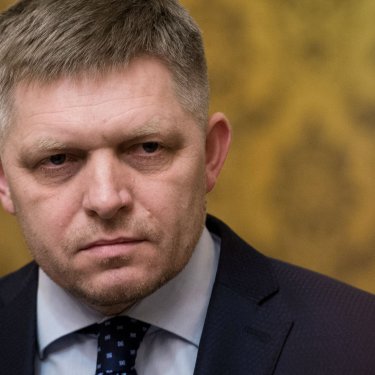RSF asks former Slovak PM Robert Fico to stop legitimising harassment of journalists

Condemning the online attacks that a Slovak website reporter received after describing a YouTuber as “extremist” in his coverage of a debate involving the YouTuber and former Slovak Prime Minister Robert Fico, Reporters Without Borders (RSF) calls on Fico to also condemn the attacks instead of legitimising the harassment of journalists.
“I can’t stand [journalists] anymore, it’s time to start beating them up” and “I’d knock his teeth out of his mouth” were among the hate comments and messages targeting Aktuality.sk reporter Matej Pribelsky after he covered the online debate on 11 June involving Fico and Daniel Bombic, a UK-based Slovak YouTuber better known as Danny Kollar.
As well as describing Bombic as extremist, Pribelsky’s report recalled that the Slovak authorities had issued three international warrants for his arrest allegedly due to online harassment and extremist crimes. Bombic reacted by asking his social media followers to “transmit” their “comments and impressions” to Pribelsky and promising that “the score settling will follow.”
“Agreeing to participate in a debate with an alleged instigator of harassment campaigns against journalists and systematically refusing to condemn these attacks amounts to legitimising them. We call on former Prime Minister Robert Fico to firmly denounce the calls for violence against the journalist Matej Pribelsky. As a politician, Fico should learn the lessons from journalist Jan Kuciak’s murder, which occurred after Fico made violent remarks about Slovak journalists when he was prime minister.
According to the Zive.sk news site, Bombic is allegedly the subject of proceedings in Slovakia on charges of extremist crimes and online harassment. On YouTube, he often denounces leading Slovak journalists such as Monika Todova, Vladimir Snidl and Zuzana Kovacic-Hanzelova, who are then harassed online.
Fico – the leader of the Smer party which currently leads in opinion polls ahead of parliamentary elections in September that will determine the next prime minister – is also in the habit of lambasting journalists.
Last February, he vowed to “go after” the director-general of the public media RTVS after its editors refused to allow his party to replace its representative on a politics programme at the last minute. The show’s host, Marta Janckarova, immediately received death threats from Internet users and had to be given police protection.
In 2022, several journalists who were investigating corruption cases were accused by Fico of acting like an “organised criminal group” with the aim of “breaking the statehood.”
Online and offline verbal harassment, that is fuelled by virulent remarks by Slovak politicians such as Fico, constitutes the leading threat to journalists in Slovakia, according to a recent survey by Safe.Journalism.sk, a project created by the Investigative Centre of Jan Kuciak with RSF’s support. In order to report his harassment, journalist Matej Pribelsky seized Safe.Journalism.sk which then alerted RSF.
Slovakia is ranked 17th out of 180 countries in RSF's 2023 World Press Freedom Index.
